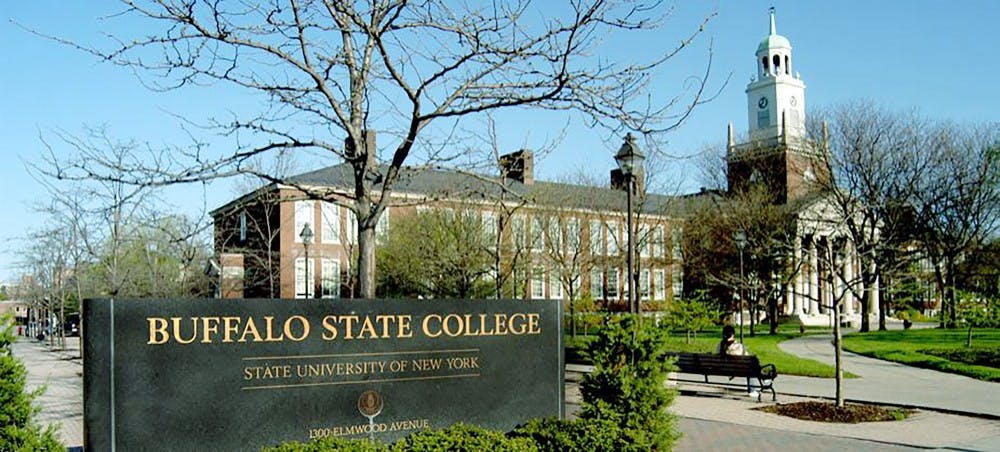The Buffalo State College Foundation improperly donated $1,250 to a local political action committee in February, New York State campaign finance filings show.
The contribution, which has since been refunded, violated IRS requirements, which prohibit tax-exempt nonprofits from political campaign activity.
After Robert Galbraith, local writer for The Public, contacted the Foundation to ask about the Feb. 8 contribution to the Buffalo-based 43-x-79 PAC, Buffalo State College officials told Galbraith the payment was made in error.
Buffalo State College Foundation Vice President Susanne Bair said in an email the contribution was intended for the 43x79 group’s “non-political philanthropic efforts” and was accidentally processed for the political action committee.
The accounting staff immediately requested a refund from the committee, which the foundation received on Nov. 17, according to Bair.
The foundation’s contribution to 43-x-79, a local business organization, was processed on the same day 12 other donations were made in the same amount, state records show. Other 43x79 donors included local business leaders and corporations, including local construction firm LP Ciminelli, global food service and hospitality company Delaware North, the Buffalo Bills and UB Commons Inc.
The 43x79 committee later donated $12,500 to Mayor Byron Brown’s campaign fund, according to campaign finance reports.
Brown, a Buffalo State College alumnus, won a fourth mayoral term this past election, with 52 percent of the vote.
Across SUNY campuses, colleges and universities have relied increasingly on private foundations to manage fundraising amid declining state funding. The Buffalo State College Foundation’s stated purpose is to support advancements in educational, charitable and philanthropic work. In 2015, it reported net assets of more than $49,000,000.
Faculty, students and groups including the faculty union United University Professions have raised concerns in recent years regarding the oversight of SUNY foundations. The union pushed for legislation to make campus foundations subject to open government laws in 2016, echoing critics who feel the private foundations, which manage endowments and handle donations to universities, are not adequately transparent.
Local attorney John Lipsitz is currently suing a UB Foundation affiliate organization. seeking to make its meetings, records and financial reports public. Judge Diane Devlin heard oral arguments on the case last month.
The Buffalo State College Foundation’s improper political contribution isn’t the first such expenditure by a SUNY-affiliated nonprofit.
In 2011, The Spectrum reported $2,560 in political contributions from the UB Foundation to then-Erie County Executive Chris Collins's re-election campaign. UB officials described the donation as an "honest mistake," and a Collins official said at the time that the money was returned.
Nonprofits are not allowed to make political contributions and doing so could jeopardize their tax-exempt status, but federal oversight of campaign contributions is “spotty,” said Daniel Weiner, senior counsel for New York University’s Brennan Center for Justice, who studies money in politics. Enforcement tends to rely on voluntary compliance, public disclosures and media scrutiny, he said.
Illegal campaign donations may go unnoticed because of these poor enforcement mechanisms, Weiner said.
“That is a problem,” Weiner said. “The reason you need enforcement beyond just disclosure and public scrutiny is that the public has a lot of other things to worry about. So it is not adequate.
“There is a sense also that if a church or other [nonprofit] organization begins to get enmeshed in politics, it begins to distract from their mission,” Weiner continued. “The same is true of a university foundation; it’s not there to promote political candidates, it’s there to ensure a university has enough money to operate. How is it part of a university’s mission to be backing a congressman or a mayor?”
For many nonprofits, the risk of looking partisan outweighs whatever benefit could be gained by donating to a campaign, Weiner said.
State schools tend to be particularly concerned about maintaining nonpartisan reputations, and for that reason, they aren’t likely to intentionally donate to campaigns, he said. If a university foundation says it made a contribution in error, Weiner said, it’s safe to take it at its word.
“I don’t think there are thousands and thousands of undisclosed contributions, but there’s obviously a potential to game the system, and the fact that we often have spotty enforcement is what creates that problem,” Weiner said. “People need to recognize the importance of these rules and I would hope that the universities’ donors and others with stake in it would would care about this, separate and apart from whether this contribution goes to a politician who they agree with.”
Sarah Crowley is the senior news editor and can be reached at sarah.crowley@ubspectrum.com.





